Charles E W Bean, Diaries, AWM38 3DRL 606/268/1 - 1917 - 1936 - Part 2
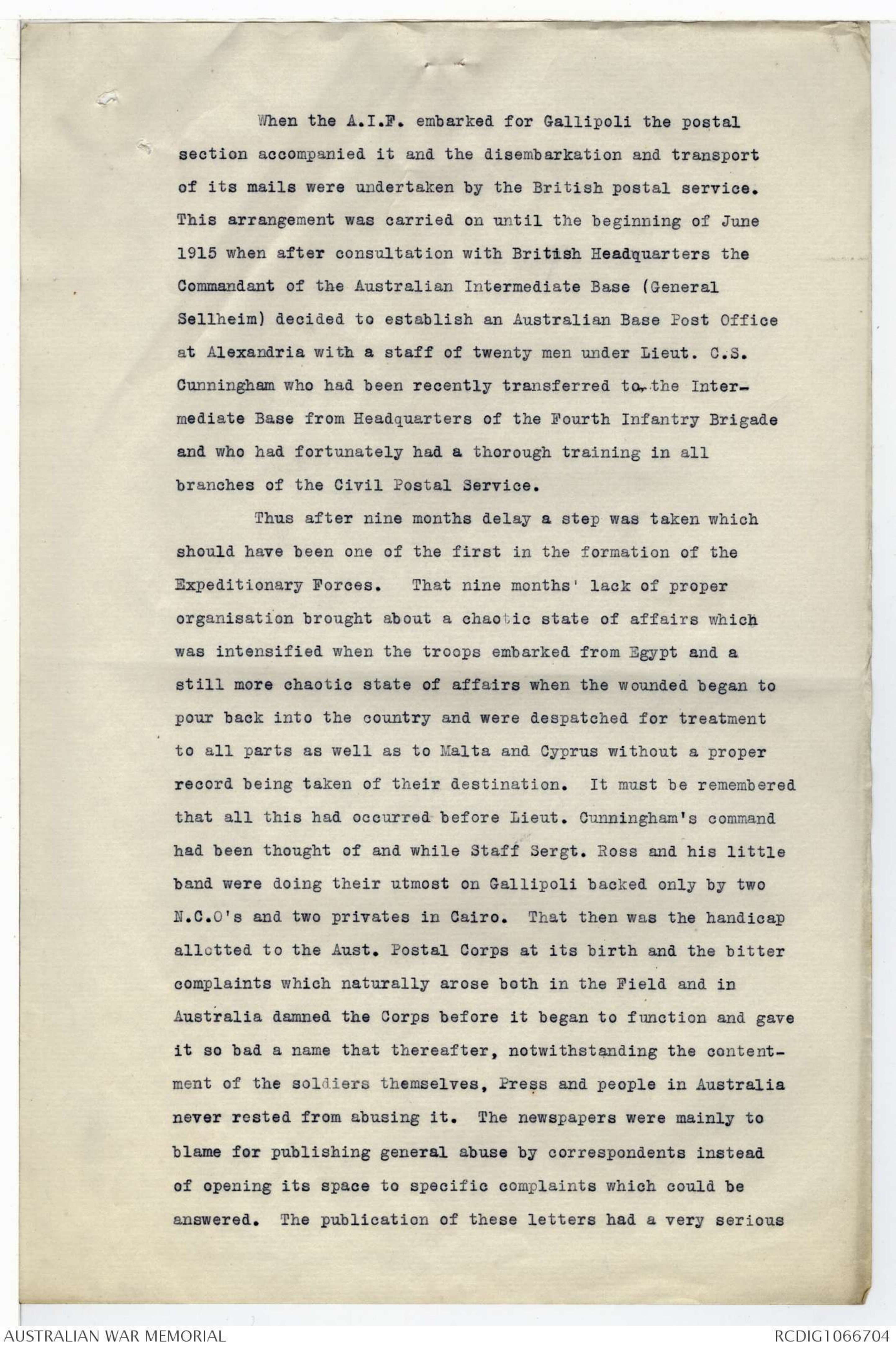
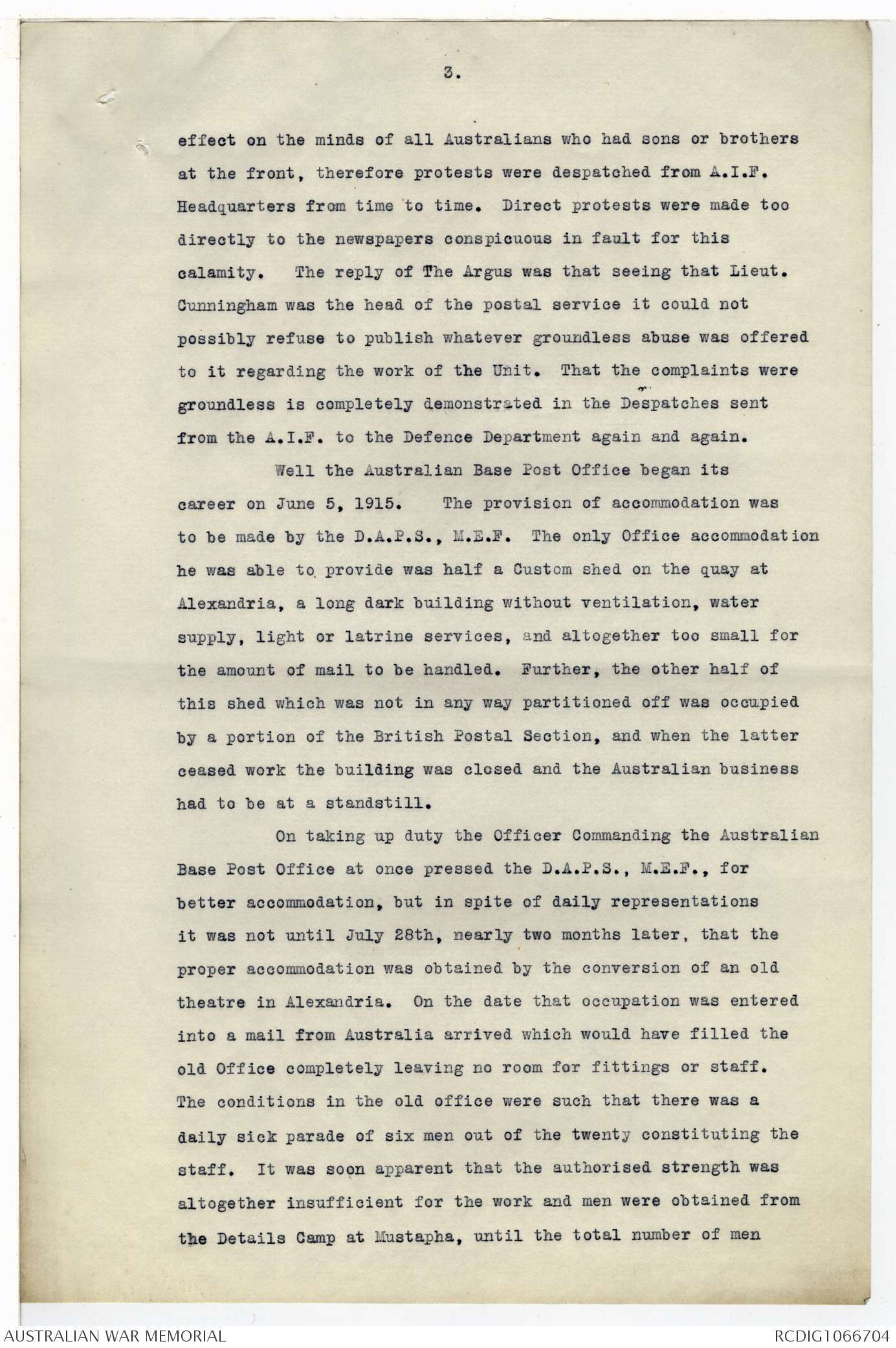
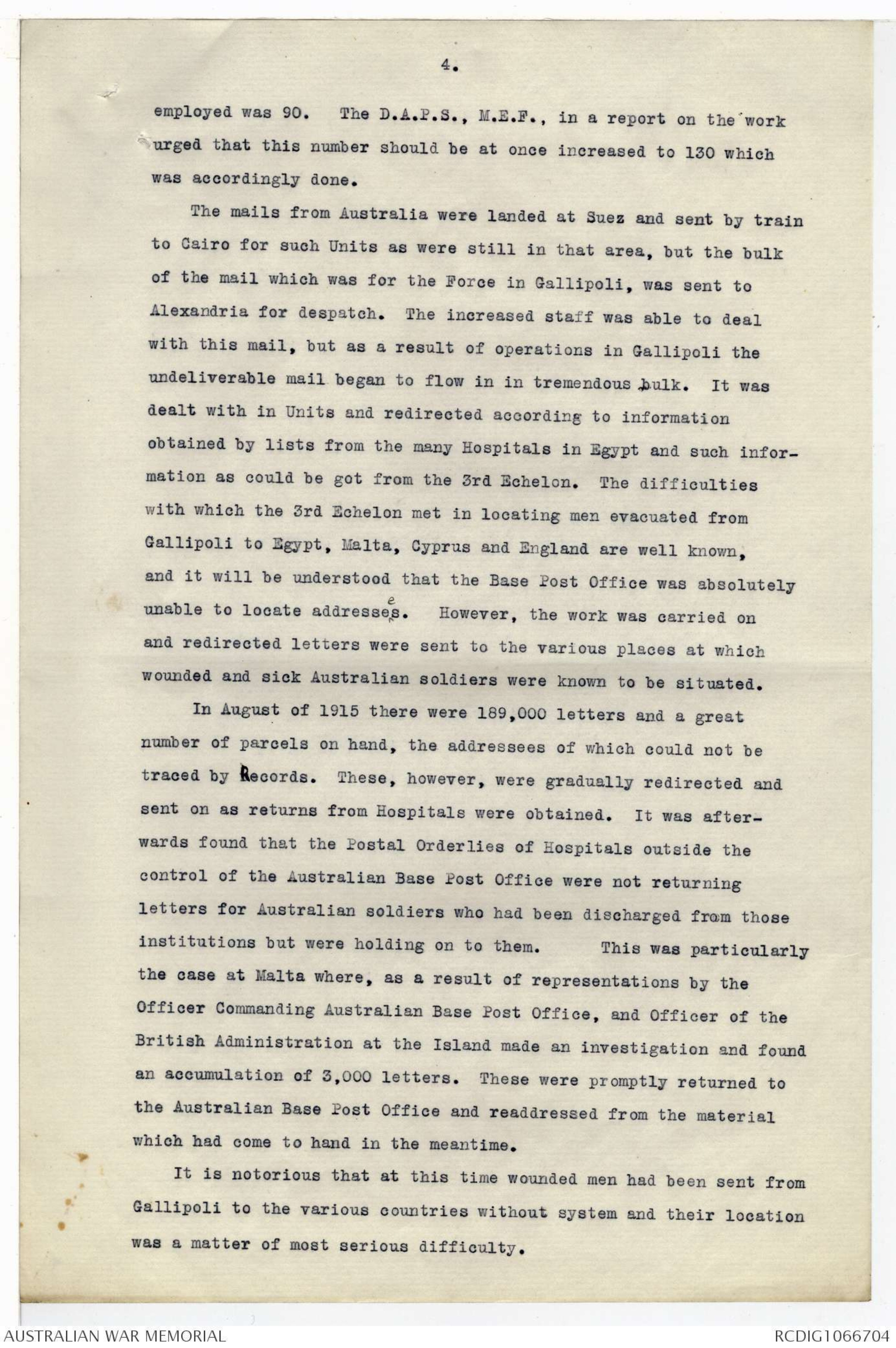
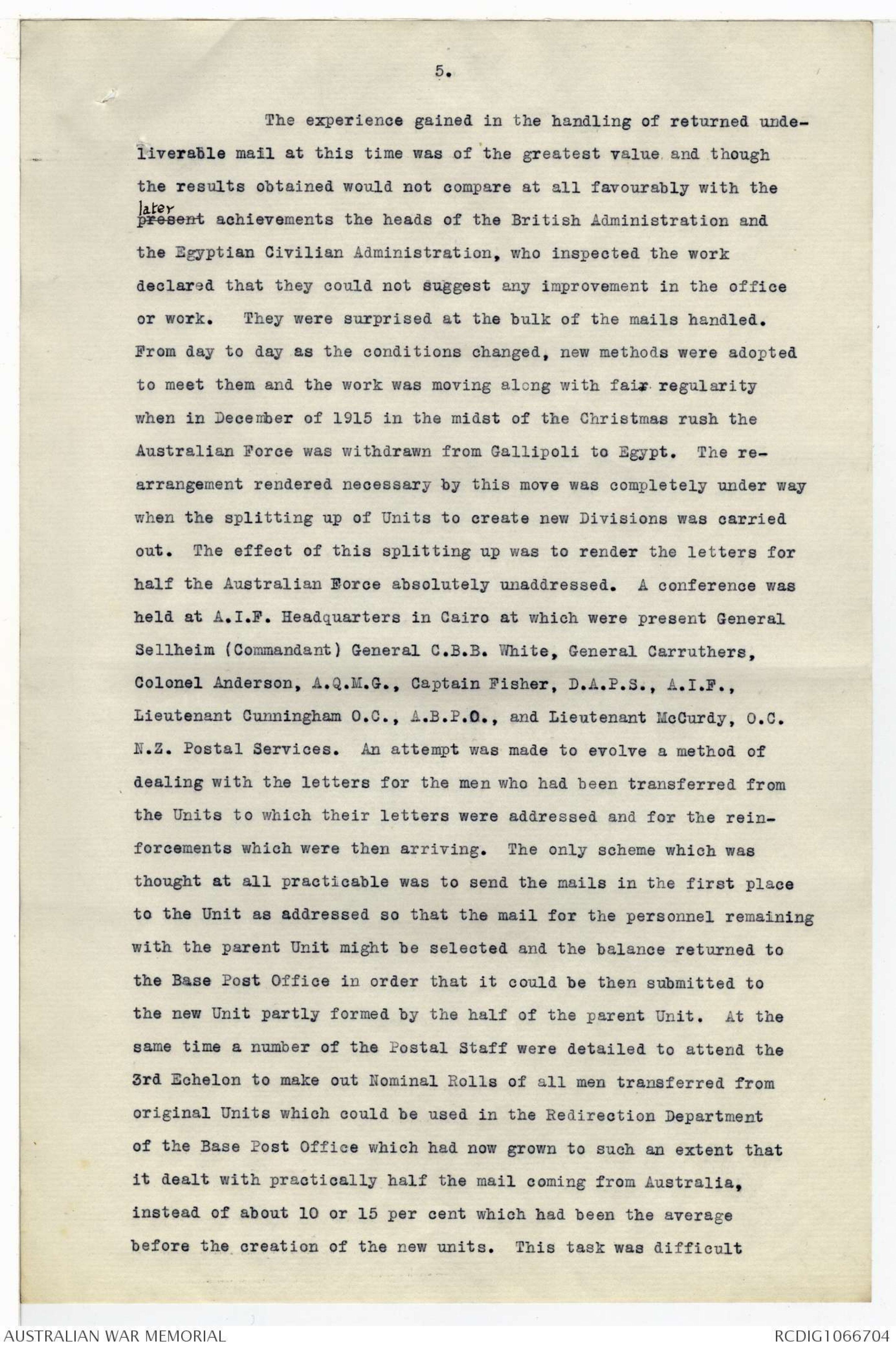
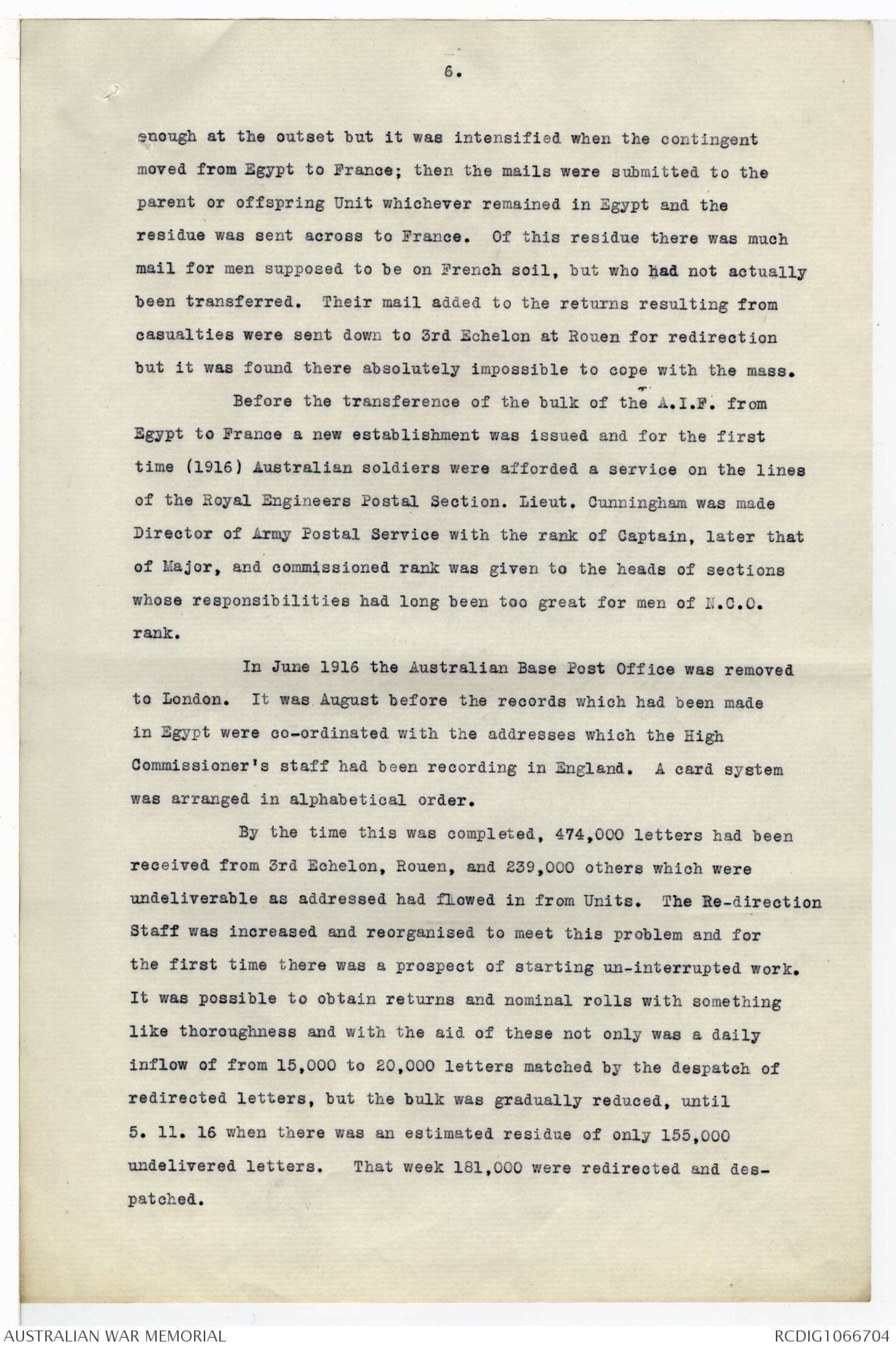
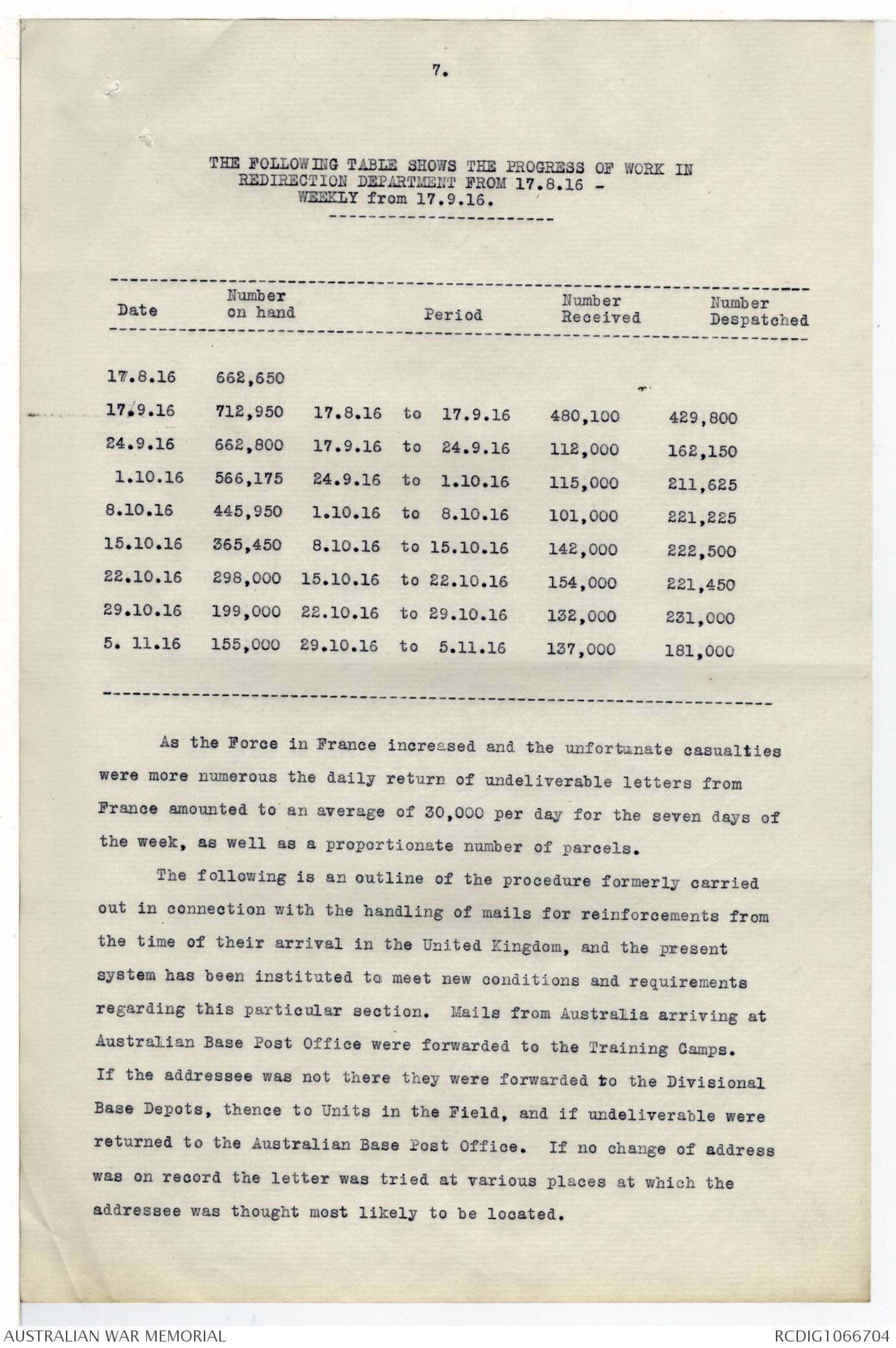
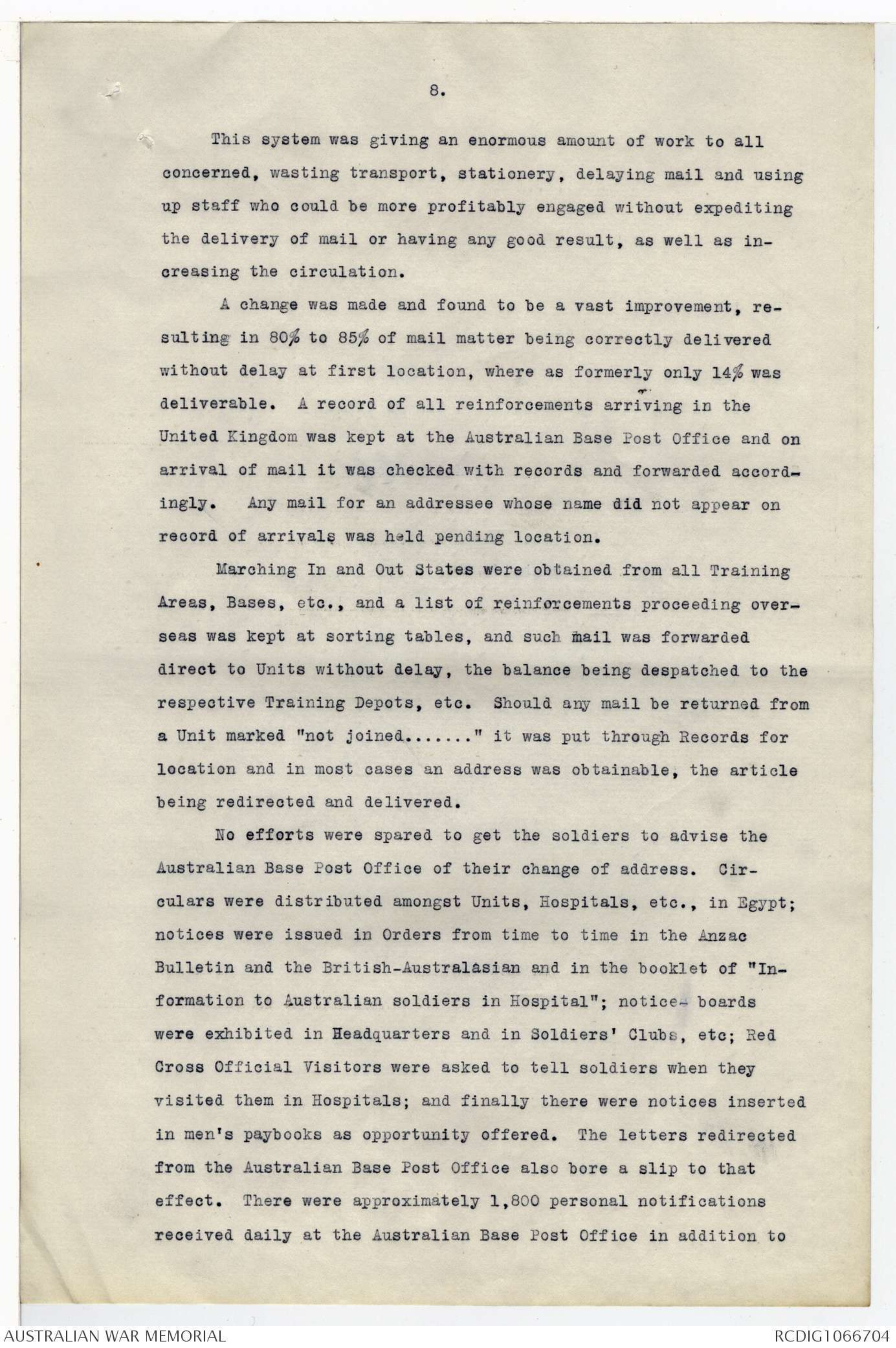
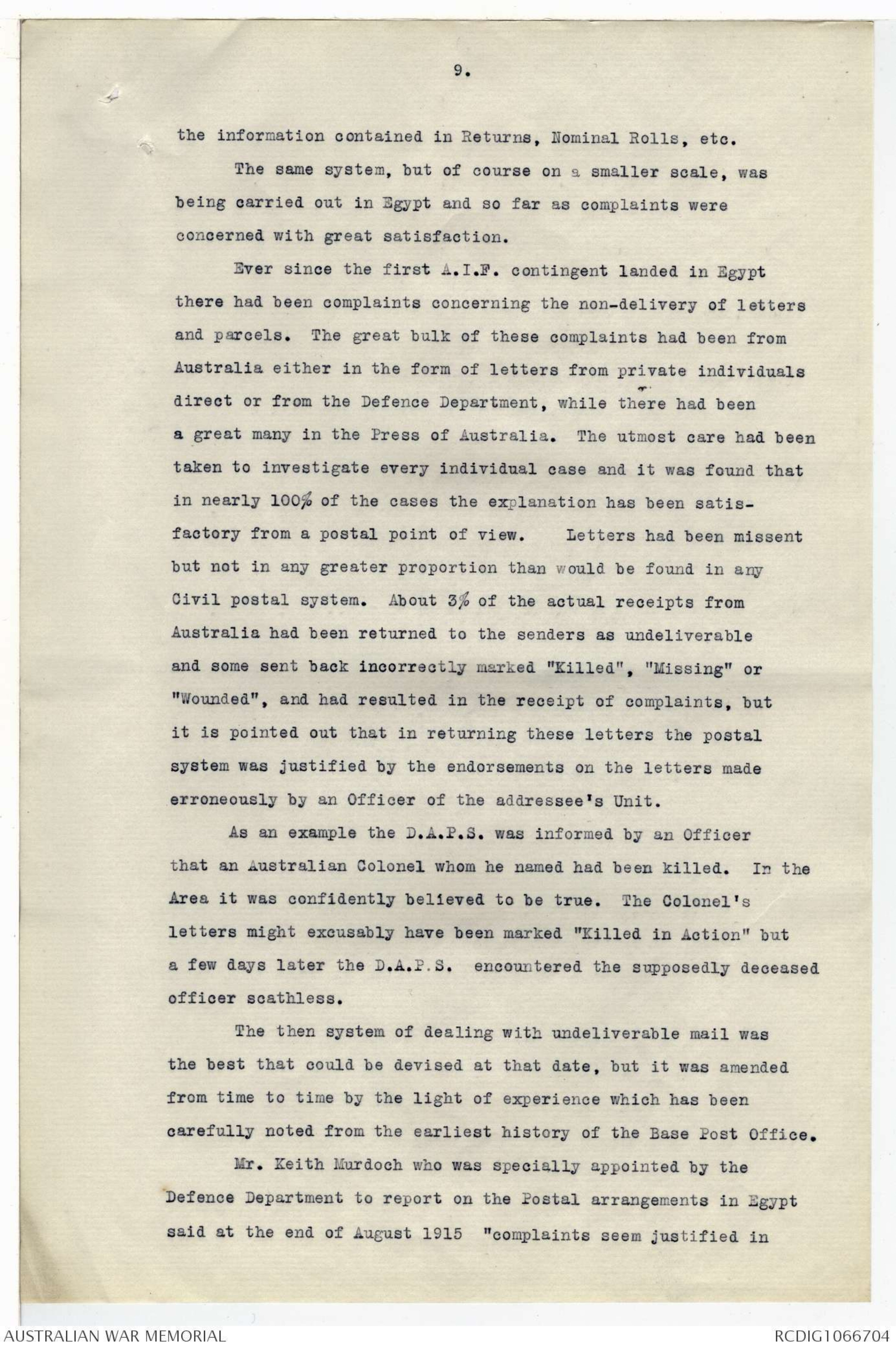
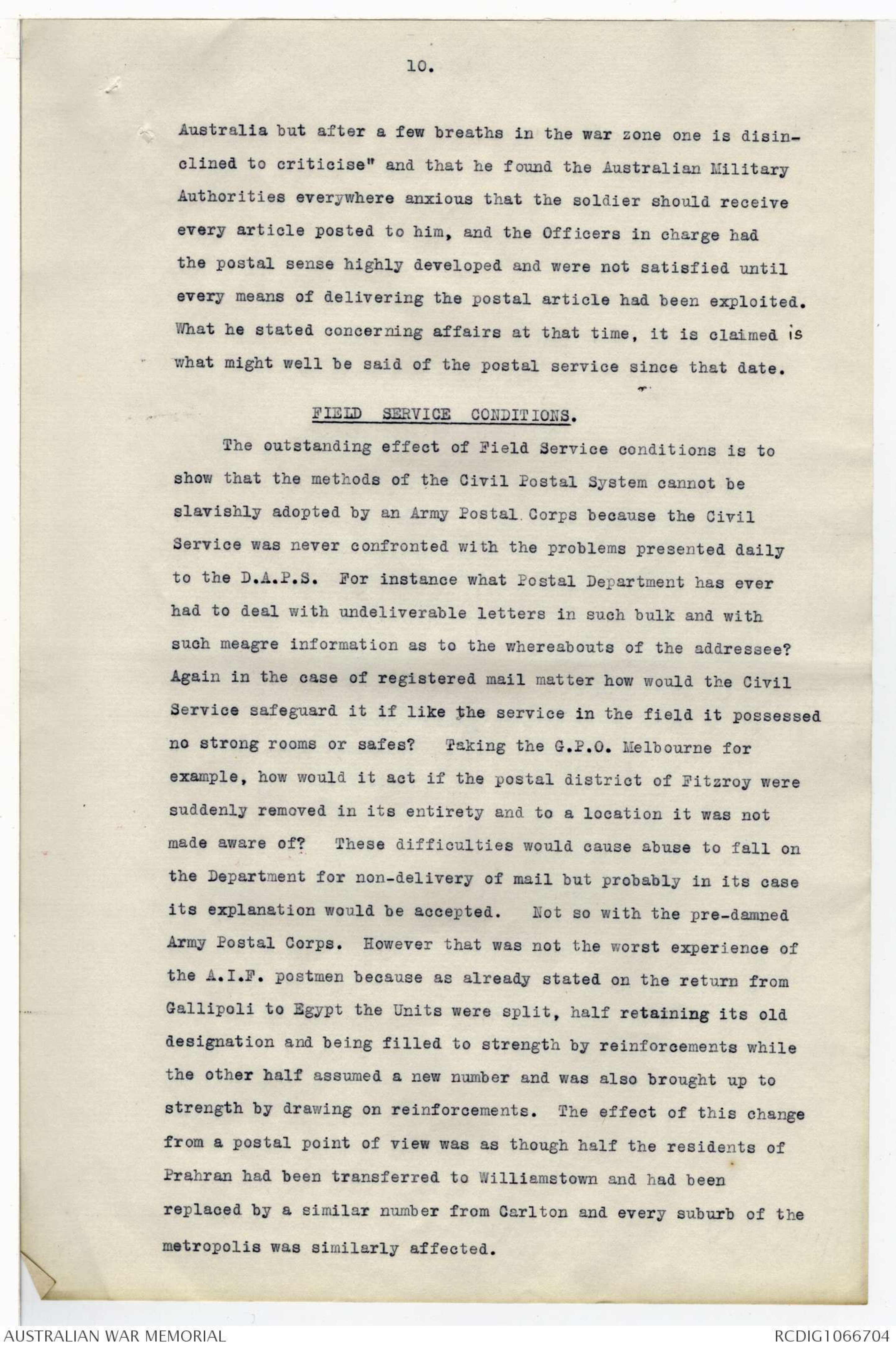
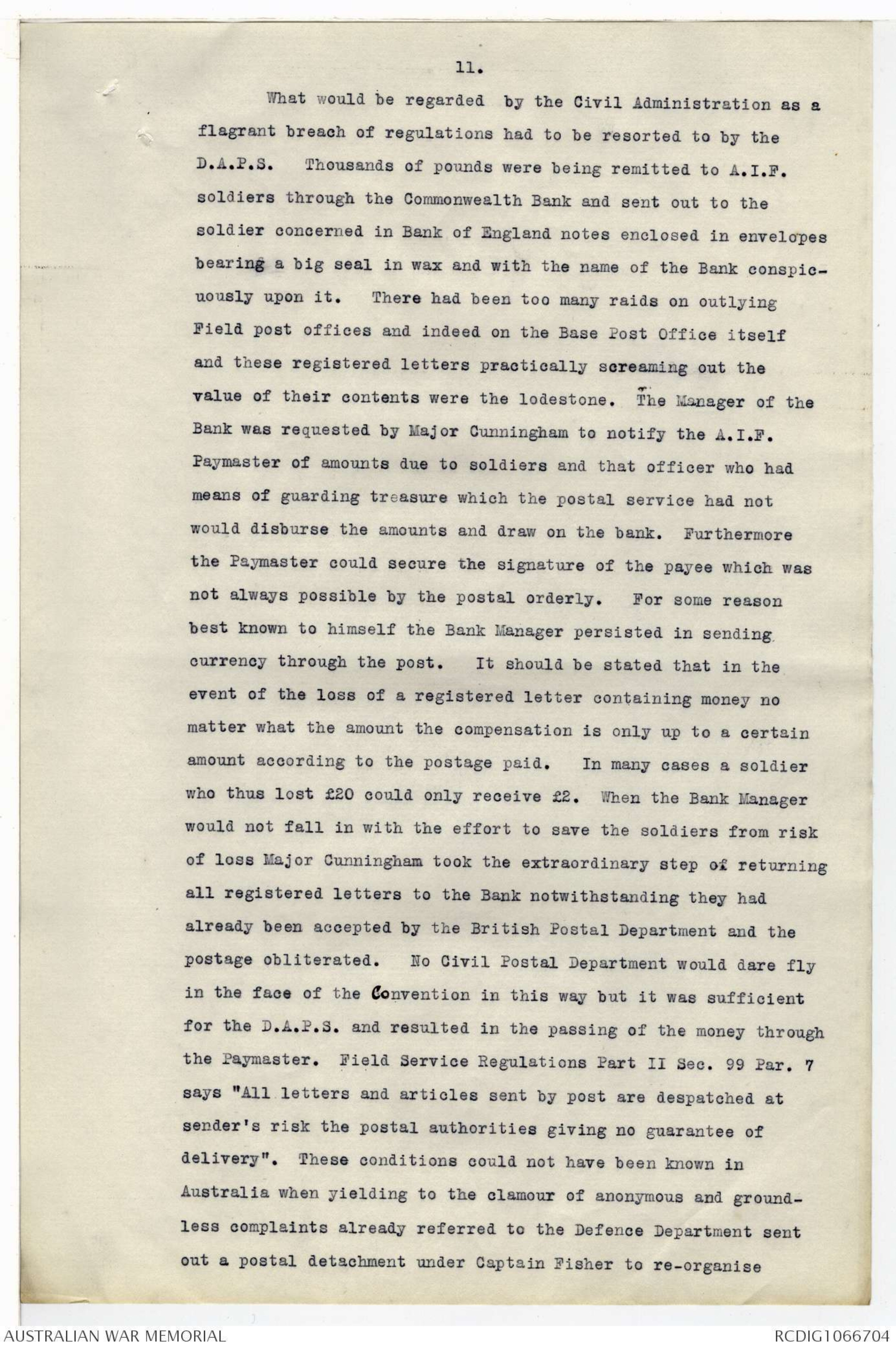
When the A.I.F. embarked for Gallipoli the postal
section accompanied it and the disembarkation and transport
of its mails were undertaken by the British postal service.
This arrangement was carried on until the beginning of June
1915 when after consultation with British Headquarters the
Commandant of the Australian Intermediate Base (General
Sellheim) decided to establish an Australian Base Post Office
at Alexandria with a staff of twenty men under Lieut. C.S.
Cunningham who had been recently transferred to the Intermediate
Base from Headquarters of the Fourth Infantry Brigade
and who had fortunately had a thorough training in all
branches of the Civil Postal Service.
Thus after nine months delay a step was taken which
should have been one of the first in the formation of the
Expeditionary Forces. That nine months' lack of proper
organisation brought about a chaotic state of affairs which
was intensified when the troops embarked from Egypt and a
still more chaotic state of affairs when the wounded began to
pour back into the country and were despatched for treatment
to all parts as well as to Malta and Cyprus without a proper
record being taken of their destination. It must be remembered
that all this had occurred before Lieut. Cunningham's command
had been thought of and while Staff Sergt. Ross and his little
band were doing their utmost on Gallipoli backed only by two
N.C.O's and two privates in Cairo. That then was the handicap
allotted to the Aust. Postal Corps at its birth and the bitter
complaints which naturally arose both in the Field and in
Australia damned the Corps before it began to function and gave
it so bad a name that thereafter, notwithstanding the contentment
of the soldiers themselves, Press and people in Australia
never rested from abusing it. The newspapers were mainly to
blame for publishing general abuse by correspondents instead
of opening its space to specific complaints which could be
answered. The publication of these letters had a very serious
3.
effect on the minds of all Australians who had sons or brothers
at the front, therefore protests were despatched from A.I.F.
Headquarters from time to time. Direct protests were made too
directly to the newspapers conspicuous in fault for this
calamity. The reply of The Argus was that seeing that Lieut.
Cunningham was the head of the postal service it could not
possibly refuse to publish whatever groundless abuse was offered
to it regarding the work of the Unit. That the complaints were
groundless is completely demonstrated in the Despatches sent
from the A.I.F. to the Defence Department again and again.
Well the Australian Base Post Office began its
career on June 5, 1915. The provision of accommodation was
to be made by the D.A.P.S., M.E.F. The only Office accommodation
he was able to provide was half a Custom shed on the quay at
Alexandria, a long dark building without ventilation, water
supply, light or latrine services, and altogether too small for
the amount of mail to be handled. Further, the other half of
this shed which was not in any way partitioned off was occupied
by a portion of the British Postal Section, and when the latter
ceased work the building was closed and the Australian business
had to be at a standstill.
On taking up duty the Officer Commanding the Australian
Base Post Office at once pressed the D.A.P.S., M.E.F., for
better accommodation, but in spite of daily representations
it was not until July 28th, nearly two months later, that the
proper accommodation was obtained by the conversion of an old
theatre in Alexandria. On the date that occupation was entered
into a mail from Australia arrived which would have filled the
old Office completely leaving no room for fittings or staff.
The conditions in the old office were such that there was a
daily sick parade of six men out of the twenty constituting the
staff. It was soon apparent that the authorised strength was
altogether insufficient for the work and men were obtained from
the Details Camp at Mustapha, until the total number of men
4.
employed was 90. The D.A.P.S., M.E.F., in a report on the work
urged that this number should be at once increased to 130 which
was accordingly done.
The mails from Australia were landed at Suez and sent by train
to Cairo for such Units as were still in that area, but the bulk
of the mail which was for the Force in Gallipoli, was sent to
Alexandria for despatch. The increased staff was able to deal
with this mail, but as a result of operations in Gallipoli the
undeliverable mail began to flow in in tremendous bulk. It was
dealt with in Units and redirected according to information
obtained by lists from the many Hospitals in Egypt and such information
as could be got from the 3rd Echelon. The difficulties
with which the 3rd Echelon met in locating men evacuated from
Gallipoli to Egypt, Malta, Cyprus and England are well known,
and it will be understood that the Base Post Office was absolutely
unable to locate addresse^es. However, the work was carried on
and redirected letters were sent to the various places at which
wounded and sick Australian soldiers were known to be situated.
In August of 1915 there were 189,000 letters and a great
number of parcels on hand, the addressees of which could not be
traced by Records. These, however, were gradually redirected and
sent on as returns from Hospitals were obtained. It was afterwards
found that the Postal Orderlies of Hospitals outside the
control of the Australian Base Post Office were not returning
letters for Australian soldiers who had been discharged from those
institutions but were holding on to them. This was particularly
the case at Malta where, as a result of representations by the
Officer Commanding Australian Base Post Office, and Officer of the
British Administration at the Island made an investigation and found
an accumulation of 3,000 letters. These were promptly returned to
the Australian Base Post Office and readdressed from the material
which had come to hand in the meantime.
It is notorious that at this time wounded men had been sent from
Gallipoli to the various countries without system and their location
was a matter of most serious difficulty.
5.
The experience gained in the handling of returned undeliverable
mail at this time was of the greatest value and though
the results obtained would not compare at all favorably with the
later present achievements the heads of the British Administration and
the Egyptian Civilian Administration, who inspected the work
declared that they could not suggest any improvement in the office
or work. They were surprised at the bulk of the mails handled.
From day to day as the conditions changed, new methods were adopted
to meet them and the work was moving along with fair regularity
when in December of 1915 in the midst of the Christmas rush the
Australian Force was withdrawn from Gallipoli to Egypt. The rearrangement
rendered necessary by this move was completely under way
when the splitting up of Units to create new Divisions was carried
out. The effect of this splitting up was to render the letters for
half the Australian Force absolutely unaddressed. A conference was
held at A.I.F. Headquarters in Cairo at which were present General
Sellheim (Commandant) General C.B.B. White, General Carruthers,
Colonel Anderson, A.Q.M.G., Captain Fisher, D.A.P.S., A.I.F.,
Lieutenant Cunningham O.C., A.B.P.O., and Lieutenant McCurdy, O.C.
N.Z. Postal Services. An attempt was made to evolve a method of
dealing with the letters for the men who had been transferred from
the Units to which their letters were addressed and for the reinforcements
which were then arriving. The only scheme which was
thought at all practicable was to send the mails in the first place
to the Unit as addressed so that the mail for the personnel remaining
with the parent Unit might be selected and the balance returned to
the Base Post Office in order that it could be then submitted to
the new Unit partly formed by the half of the parent Unit. At the
same time a number of the Postal Staff were detailed to attend the
3rd Echelon to make out Nominal Rolls of all men transferred from
original Units which could be used in the Redirection Department
of the Base Post Office which had now grown to such an extent that
it dealt with practically half the mail coming from Australia,
instead of about 10 or 15 per cent which had been the average
before the creation of the new units. This task was difficult
6.
enough at the outset but it was intensified when the contingent
moved from Egypt to France; then the mails were submitted to the
parent or offspring Unit whichever remained in Egypt and the
residue was sent across to France. Of this residue there was much
mail for men supposed to be on French soil, but who had not actually
been transferred. Their mail added to the returns resulting from
casualties were sent down to 3rd Echelon at Rouen for redirection
but it was found there absolutely impossible to cope with the mass.
Before the transference of the bulk of the A.I.F. from
Egypt to France a new establishment was issued and for the first
time (1916) Australian soldiers were afforded a service on the lines
of the Royal Engineers Postal Section. Lieut. Cunningham was made
Director of Army Postal Service with the rank of Captain, later that
of Major, and commissioned rank was given to the heads of sections
whose responsibilities had long been too great for men of N.C.O.
rank.
In June 1916 the Australian Base Post Office was removed
to London. It was August before the records which had been made
in Egypt were co-ordinated with the addresses which the High
Commissioner's staff had been recording in England. A card system
was arranged in alphabetical order.
By the time this was completed, 474,000 letters had been
received from 3rd Echelon, Rouen, and 239,000 others which were
undeliverable as addressed had flowed in from Units. The Re-direction
Staff was increased and reorganised to meet this problem and for
the first time there was a prospect of starting un-interrupted work.
It was possible to obtain returns and nominal rolls with something
like thoroughness and with the aid of these not only was a daily
inflow of from 15,000 to 20,000 letters matched by the despatch of
redirected letters, but the bulk was gradually reduced, until
5. 11. 16 when there was an estimated residue of only 155,000
undelivered letters. That week 181,000 were redirected and despatched.
7.
THE FOLLOWING TABLE SHOWS THE PROGRESS OF WORK IN
REDIRECTION DEPARTMENT FROM 17.8.16 -
WEEKLY from 17.9.16.
| Date | Number on hand |
Period | Number Received |
Number Despatched |
| 17.8.16 | 662,650 | |||
| 17.9.16 | 712,950 | 17.8.16 to 17.9.16 | 480,100 | 429,800 |
| 24.9.16 | 662,800 | 17.9.16 to 24.9.16 | 112,000 | 162,150 |
| 1.10.16 | 566,175 | 24.9.16 to 1.10.16 | 115,000 | 211,625 |
| 8.10.16 | 445,950 | 1.10.16 to 8.10.16 | 101,000 | 221,225 |
| 15.10.16 | 365,450 | 8.10.16 to 15.10.16 | 142,000 | 222,500 |
| 22.10.16 | 298,000 | 15.10.16 to 22.10.16 | 154,000 | 221,450 |
| 29.10.16 | 199,000 | 22.10.16 to 29.10.16 | 132,000 | 231,000 |
| 5.11.16 | 155,000 | 29.10.16 to 5.11.16 | 137,000 | 181,000 |
As the Force in France increased and the unfortunate casualties
were more numerous the daily return of undeliverable letters from
France amounted to an average of 30,000 per day for the seven days of
the week, as well as a proportionate number of parcels.
The following is an outline of the procedure formerly carried
out in connection with the handling of mails for reinforcements from
the time of their arrival in the United Kingdom, and the present
system has been instituted to meet new conditions and requirements
regarding this particular section. Mails from Australia arriving at
Australian Base Post Office were forwarded to the Training Camps.
If the addressee was not there they were forwarded to the Divisional
Base Depots, thence to Units in the Field, and if undeliverable were
returned to the Australian Base Post Office. If no change of address
was on record the letter was tried at various places at which the
addressee was thought most likely to be located.
8.
This system was giving an enormous amount of work to all
concerned, wasting transport, stationery, delaying mail and using
up staff who could be more profitably engaged without expediting
the delivery of mail or having any good result, as well as increasing
the circulation.
A change was made and found to be a vast improvement, resulting
in 80% to 85% of mail matter being correctly delivered
without delay at first location, where as formerly only 14% was
deliverable. A record of all reinforcements arriving in the
United Kingdom was kept at the Australian Base Post Office and on
arrival of mail it was checked with records and forwarded accordingly.
Any mail for an addressee whose name did not appear on
record of arrivals was held pending location.
Marching In and Out States were obtained from all Training
Areas, Bases, etc., and a list of reinforcements proceeding overseas
was kept at sorting tables, and such mail was forwarded
direct to Units without delay, the balance being despatched to the
respective Training Depots, etc. Should any mail be returned from
a Unit marked "not joined....... " it was put through Records for
location and in most cases an address was obtainable, the article
being redirected and delivered.
No efforts were spared to get the soldiers to advise the
Australian Base Post Office of their change of address. Circulars
were distributed amongst Units, Hospitals, etc., in Egypt;
notices were issued in Orders from time to time in the Anzac
Bulletin and the British-Australasian and in the booklet of "Information
to Australian soldiers in Hospital"; notice- boards
were exhibited in Headquarters and in Soldiers' Clubs, etc; Red
Cross Official Visitors were asked to tell soldiers when they
visited them in Hospitals; and finally there were notices inserted
in men's paybooks as opportunity offered. The letters redirected
from the Australian Base Post Office also bore a slip to that
effect. There were approximately 1,800 personal notifications
received daily at the Australian Base Post Office in addition to
9.
the information contained in Returns, Nominal Rolls, etc.
The same system, but of course on a smaller scale, was
being carried out in Egypt and so far as complaints were
concerned with great satisfaction.
Ever since the first A.I.F. contingent landed in Egypt
there had been complaints concerning the non-delivery of letters
and parcels. The great bulk of these complaints had been from
Australia either in the form of letters from private individuals
direct or from the Defence Department, while there had been
a great many in the Press of Australia. The utmost care had been
taken to investigate every individual case and it was found that
in nearly 100% of the cases the explanation has been satisfactory
from a postal point of view. Letters had been missent
but not in any greater proportion than would be found in any
Civil postal system. About 3% of the actual receipts from
Australia had been returned to the senders as undeliverable
and some sent back incorrectly marked "Killed", "Missing" or
"Wounded", and had resulted in the receipt of complaints, but
it is pointed out that in returning these letters the postal
system was justified by the endorsements on the letters made
erroneously by an Officer of the addressee's Unit.
As an example the D.A.P.S. was informed by an Officer
that an Australian Colonel whom he named had been killed. In the
Area it was confidently believed to be true. The Colonel's
letters might excusably have been marked "Killed in Action" but
a few days later the D.A.P.S. encountered the supposedly deceased
officer scathless.
The then system of dealing with undeliverable mail was
the best that could be devised at that date, but it was amended
from time to time by the light of experience which has been
carefully noted from the earliest history of the Base Post Office.
Mr. Keith Murdoch who was specially appointed by the
Defence Department to report on the Postal arrangements in Egypt
said at the end of August 1915 "complaints seem justified in
10.
Australia but after a few breaths in the war zone one is disinclined
to criticise" and that he found the Australian Military
Authorities everywhere anxious that the soldier should receive
every article posted to him, and the Officers in charge had
the postal sense highly developed and were not satisfied until
every means of delivering the postal article had been exploited.
What he stated concerning affairs at that time, it is claimed is
what might well be said of the postal service since that date.
FIELD SERVICE CONDITIONS.
The outstanding effect of Field Service conditions is to
show that the methods of the Civil Postal System cannot be
slavishly adopted by an Army Postal Corps because the Civil
Service was never confronted with the problems presented daily
to the D.A.P.S. For instance what Postal Department has ever
had to deal with undeliverable letters in such bulk and with
such meagre information as to the whereabouts of the addressee?
Again in the case of registered mail matter how would the Civil
Service safeguard it if like the service in the field it possessed
no strong rooms or safes? Taking the G.P.O. Melbourne for
example, how would it act if the postal district of Fitzroy were
suddenly removed in its entirety and to a location it was not
made aware of? These difficulties would cause abuse to fall on
the Department for non-delivery of mail but probably in its case
its explanation would be accepted. Not so with the pre-damned
Army Postal Corps. However that was not the worst experience of
the A.I.F. postmen because as already stated on the return from
Gallipoli to Egypt the Units were split, half retaining its old
designation and being filled to strength by reinforcements while
the other half assumed a new number and was also brought up to
strength by drawing on reinforcements. The effect of this change
from a postal point of view was as though half the residents of
Prahran had been transferred to Williamstown and had been
replaced by a similar number from Carlton and every suburb of the
metropolis was similarly affected.
11.
What would be regarded by the Civil Administration as a
flagrant breach of regulations had to be resorted to by the
D.A.P.S. Thousands of pounds were being remitted to A.I.F.
soldiers through the Commonwealth Bank and sent out to the
soldier concerned in Bank of England notes enclosed in envelopes
bearing a big seal in wax and with the name of the Bank conspicuously
upon it. There had been too many raids on outlying
Field post offices and indeed on the Base Post Office itself
and these registered letters practically screaming out the
value of their contents were the lodestone. The Manager of the
Bank was requested by Major Cunningham to notify the A.I.F.
Paymaster of amounts due to soldiers and that officer who had
means of guarding treasure which the postal service had not
would disburse the amounts and draw on the bank. Furthermore
the Paymaster could secure the signature of the payee which was
not always possible by the postal orderly. For some reason
best known to himself the Bank Manager persisted in sending
currency through the post. It should be stated that in the
event of the loss of a registered letter containing money no
matter what the amount the compensation is only up to a certain
amount according to the postage paid. In many cases a soldier
who thus lost £20 could only receive £2. When the Bank Manager
would not fall in with the effort to save the soldiers from risk
of loss Major Cunningham took the extraordinary step of returning
all registered letters to the Bank notwithstanding they had
already been accepted by the British Postal Department and the
postage obliterated. No Civil Postal Department would dare fly
in the face of the Convention in this way but it was sufficient
for the D.A.P.S. and resulted in the passing of the money through
the Paymaster. Field Service Regulations Part II Sec. 99 Par. 7
says "All letters and articles sent by post are despatched at
sender's risk the postal authorities giving no guarantee of
delivery". These conditions could not have been known in
Australia when yielding to the clamour of anonymous and groundless
complaints already referred to the Defence Department sent
out a postal detachment under Captain Fisher to re-organise
 Sue Harris
Sue HarrisThis transcription item is now locked to you for editing. To release the lock either Save your changes or Cancel.
This lock will be automatically released after 60 minutes of inactivity.